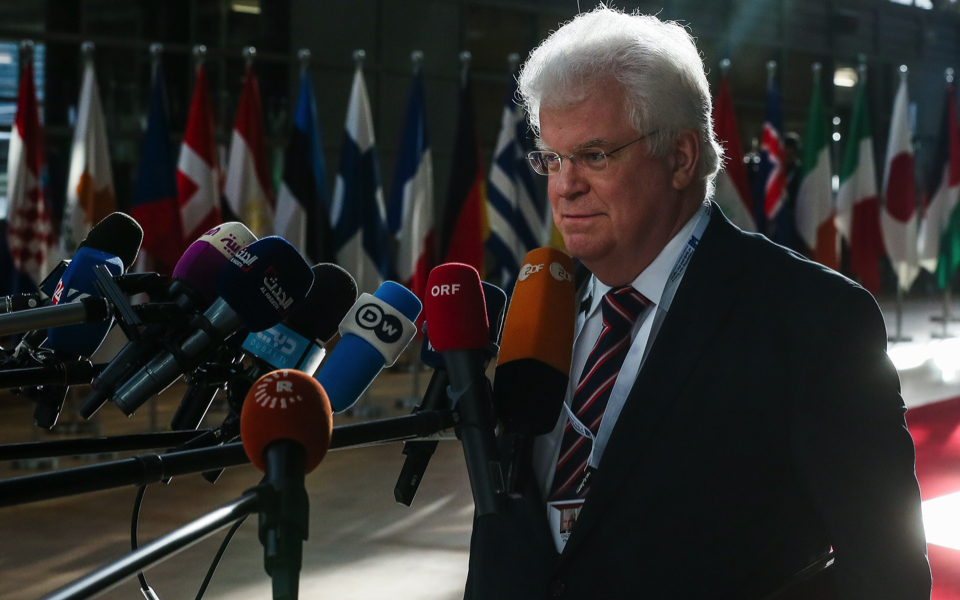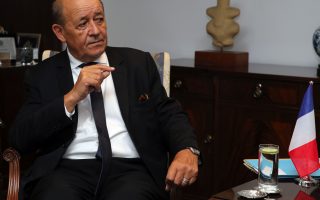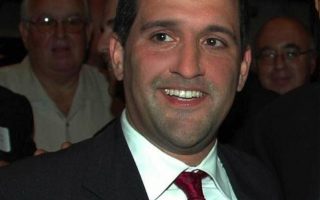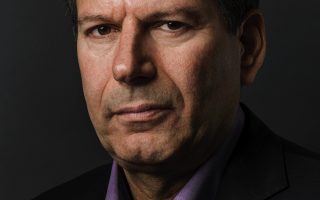Chizhov: Moscow does not meddle in others’ affairs

“Is this a democratic way to solve a problem?” Russia’s Permanent Representative to the European Union Vladimir Chizhov remarked on the name deal between Greece and North Macedonia during an interview with Kathimerini on the sidelines of the Delphi Economic Forum earlier this month. He also warned against Tirana’s ambition to create a “greater Albania” as the putative territory swap between Kosovo and Serbia could set a precedent for other countries in the region. “I have seen some maps of the greater Albania, where a sizable chunk of Greece is included,” he noted. Asked about Turkey’s deal to buy S-400 missile systems from Russia, Chizhov said that if “Greece wants some S-400s, it knows where to apply.”
What is your take on Russian meddling in the US elections 2016, last year’s midterms and the upcoming European elections?
It’s difficult to comment on nonexistent things. I think this virus of paranoia first emerged in 2016, when the Democrats lost the US elections and then managed to cross the Atlantic. It’s a new scientific trend. First it made a stop in the United Kingdom with the Salisbury scandal, which has yet to provide any tiny bit of evidence. Where are the Skripals? Are they dead or alive? Russia as a state never intervenes in the internal affairs of other countries. Not even Venezuela.
We are witnessing a growing Russia-US clash on several fronts, from Syria to Turkey (regarding the sale of S-400 missiles to Ankara) to Venezuela. Is Donald Trump’s presidency bringing the two countries closer or widening the gap between them?
I wouldn’t say our problems started with Trump coming to the White House. Who scrapped the Anti-Ballistic Missile (AMB) Treaty in 2001? It wasn’t Trump. He wasn’t even thinking of building the Trump Tower in Moscow. He was busy organizing beauty pageants. You mentioned the S-400. What made Washington angry is the fact that [the slogan] “putting America first” meant that all allies had to stand in line and buy American weapons. We are witnessing this across Western Europe. Belgium, where I live, also chose American F-35s, which are more expensive and hardly more efficient. Some NATO countries also think that by buying American planes they will fullfil the obligation to raise their expenses to 2 percent of their GDP, another US demand. So if Greece wants some S-400s, it knows where to apply.
Do you believe we are on the brink of a new arms race, considering the looming annulment of the Intermediate-Range Nuclear Forces (INF) Treaty?
Unfortunately it’s dead. But we are not going to funnel a bunch of money into maintaining an arms race. I belong to the generation which followed with great interest the negotiations of these disarmament treaties, including the INF. It was 1997, the time of Gorbachev, glasnost and perestroika, there was a free discussion on the merits of these agreements. There were similar discussions on the American side: Who won? Who gained, who lost more? But there was no discussion of this sort in Europe. Europe was the main beneficiary, because it was Europe where these intermediate-range missiles were deployed. And it was the territory targeted by the Russian missiles. The main difference was that Russian missiles were deployed in Soviet territory whereas the American missiles where deployed in other territory, in other countries. So what happens now? The USA is claiming that Russia has been violating the INF, but the Americans are violating it themselves, as they are putting ABM systems in Poland and Romania and they are using heavy drones, which are not mentioned in the treaty as there weren’t any at that time. Now they say we want a new, multilateral agreement that will include the Chinese. But they never asked China.
What about the Balkans – including Greece? Do you see an opportunity for Russia to implement its soft power diplomacy in the region, or do you believe the region is turning its gaze toward the West, after the Prespes agreement that opened the door for entry talks with the EU?
The American ambassador spent the whole day at the Macedonian Parliament pressing three MPs who had been serving prison sentences; they were freed from detention in order to vote. We were openly against the agreement, because this is not the way to solve a problem. Of course the issue of the name – ridiculous as it might seem to the rest of the world – should have been solved long ago. I have been telling this to my Greek and Macedonian friends, that the longer they procrastinate the more the positions of the two sides will get cemented. So, today I listened to [conservative opposition New Democracy leader Kyriakos] Mitsotakis saying 70 percent of the Greek population think it’s a bad deal. A similar proportion in Northern Macedonia is against it. Is this a democratic way to solve a problem? The Macedonian Constitution was openly violated, the referendum was declared invalid, the president didn’t sign it, and now my colleagues at the EU are saying that this should serve as a template for resolving other issues. And the first that is brought to mind is Kosovo. Kosovo, by the way, is a very complicated issue. If they agree properly, the land-swap proposal might work out. But this may establish a precedent, which could create problems also in Northern Macedonia, where a substantial proportion of the population is Albanian. I have seen some maps of the greater Albania, where a sizable chunk of Greece is included.
Do you predict German realpolitik in pursuing a new gas pipeline across the Baltic Sea (Nord Stream 2) will prevail over European reservations concerning energy dependence on Moscow?
It’s not German perseverance. It’s a realistic approach. When Nord Stream 1 was built some years ago, it was declared a project of EU priority. And everything went fine, nobody said a word. Now the second pipeline, starting from a different place in Russia and running across the Baltic Sea to Germany – the idea didn’t belong to the Russian government. It didn’t belong to Gazprom either. It was the idea of several European energy companies – there are five of them involved, from Germany, France, the Netherlands, the UK and Italy. We believe that it enhances Europe’s energy security rather than the other way round. Some people admit that behind the opposition is concern over transit of Russian gas through Ukraine. We are not saying it will stop. There are different networks across Europe. For example, a country neighboring Ukraine, Moldova, has no other way of getting Russian gas than through Ukraine. There have been attempts in Brussels and other cities to derail the project. But even in the European Commission there is no universal view.
What would you say to someone who points to relations with Russia being a source of friction between EU countries?
I have been dealing with the European Union for 20 years and I was among those who were warning the EU of the 2004 major enlargement, that it might have problems, because we knew these countries better than the Western members of the EU ever did. So, we knew that in some of those countries the idea of joining both the EU and NATO was driven to a large extent by the wish to get as far away from Russia as possible. But one doesn’t chose one’s parents nor one’s neighbors.
We saw Russian President Vladimir Putin focusing for the first time on social issues in his annual state-of-the-nation address. His popularity has been diminishing in recent months. Do you see the beginnings of the end of the Putin era?
When it was higher it was driven by the course of events. Now it’s more normal. I don’t think it bothers him too much. It’s his last term, he doesn’t need to care about his re-election.





